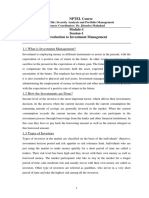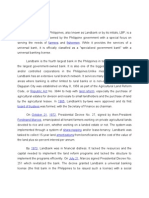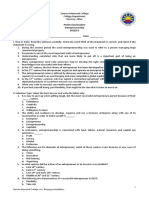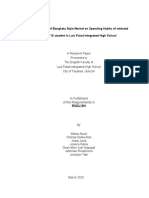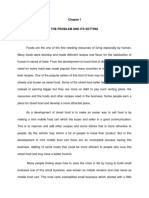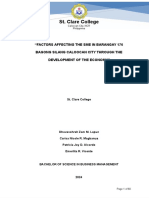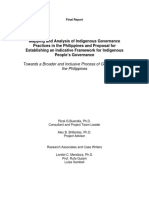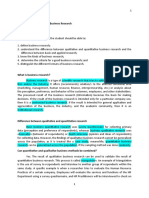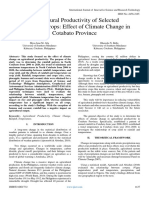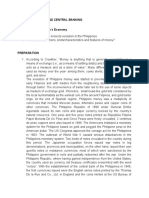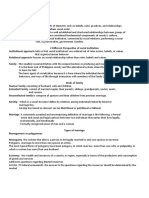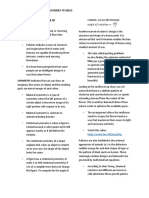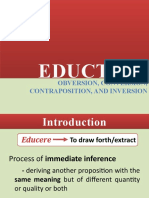Republic of the Philippines
Bicol University
Jesse M. Robredo Institute of Governance and Development
PHILIPPINE ADMINISTRATIVE THOUGHT AND INSTITUTION
BACHELOR OF PUBLIC ADMINISTRATION
ACTIVITY 1
1. Financial Institutions
Financial institutions play an important role in each country's financial system, and their importance is
growing as the economy grows. These institutions meet the long-term capital needs of the major
industries. As financial institutions play an important role in meeting the majority of citizens' financial
transactions, savings, and investment needs, the government considers it essential to supervise and
regulate banks and other financial service companies.
There are two types of financial institutions: banking financial institutions and non-banking financial
institutions. Commercial banks, which accept deposits and make loans, are examples of banking
financial institutions. Investment banks, insurance companies, finance firms, leasing companies, and
other non-banking financial institutions are examples. Let us examine both types of financial institutions
in greater detail.
The most well-known financial institution is the bank. It is a financial intermediary who acts as a go-
between for depositors or fund suppliers and lenders, who are fund users. A banking financial
institution's main tasks are to accept deposits and then use those funds to make loans to its customers,
who will then use them to fund education, expand business, invest in development, and so on.
2. Economic Institution
Consumption, production, and distribution of commodities and services are all aspects of economic
institutions. Production is taken into account because it is important to know how much goods should
be produced, whether it is profitable to invest in weapons, automobiles, or food production. And
whether to build a large manufacturing plant, a medium-sized enterprise, or a small business.
Distribution is concerned with issues such as how money should be divided among managerial level
employees, labors, and the enterprise's owner. The distribution aspect has an impact on the social
status and education of the family. Consumption concerns issues such as the demand for and supply of
goods and services. There are two dominant economic systems in the modern world: capitalism and
socialism.
� 3. Political Institution
Political organization is a part of the total organization concerned with the preservation of the social
order within a specified territory by duly authorized machinery. The state is the institution whereby
order is well achieved.
When we use the term political system, we refer to a recognized set of procedures for implementing
and obtaining the goals of a group. Each society must have a political system in order to maintain
recognized procedures for allocating valued resources—in Harold D. Lasswell’s terms, for deciding who
gets what, when, and how. Thus, like religion and the family, a political system is a cultural universal; it
is a social institution found in every society.
Types of Government
A monarchy is a form of government headed by a single member of a royal family, usually a king, queen,
or other hereditary ruler. Most monarchs have little practical power and primarily serve ceremonial
purposes.
An oligarchy is a form of government in which few individuals rule. It is rather an old method of
governing which flourished in ancient Greece and Egypt. Today, oligarchy, often takes the form of
military rule.
A dictatorship is a government in which one person has nearly total power to make and enforce laws.
Dictators typically seize power and rule primarily through the use of coercion, often including torture
and execution. Frequently, dictatorships develop such overwhelming control over people’s lives that
they are called totalitarian. Totalitarianism involves virtually complete governmental control and
surveillance over all aspects of social and political life in a society. Political scientists Carl Friedrich and
Zbigniew Brzezinski have identified six basic traits that typify totalitarian states: (1) large-scale use of
ideology; (2) one-party systems; (3) control of weapons; (4) terror; (5) control of the media; and (6)
control of the economy.
In a literal sense, democracy means government by the people. Of course, in large, populous nations,
government by all the people is impractical at the national level. Consequently, democracies are
maintained through a mode of participation known as representative democracy.
4. Family Institution
The family being the most universal of all social institutions has been assigned major
responsibilities/functions: Procreative, Economic, Socialization, Companionship, Regulation of sexual
behavior, and Ascription of status
The importance of these responsibilities or functions cannot be downplayed that they cannot be
assigned to individual initiative. A family is a relatively permanent group of persons linked together in
social roles by ties of blood, marriage, or adoption—and who live together and cooperate economically
in the rearing of children. Hence, the family is not only a biological but a social unit as well. But the
family is only a subset of larger set of relatives we call the kin group.
�A kin group is the set of relatives who interact on the basis of shared social structure. Such extent of
relationships is made possible by an institution, subsumed in the institution of the family, called
marriage. Marriage is an institutionalized social structure that provides an enduring framework for
regulating sexual behavior and childbearing. Rules for marriage include exogamy and endogamy.
The basic unit of the family is the wife-husband pair and their children. When the married pair and their
children form an independent household living apart from other kin, we call them a nuclear family.
When they live with other kin, such as parents or siblings, we refer to them as an extended family.
Whether a society favors nuclear or extended families has a great deal of influence on where a newly
married couple will live. By definition, the nuclear family lives by itself; this is called neolocal residence.
Extended families, however, may exhibit a wide variety of residence patterns. They may live with the
wife’s relatives (matrilocal) or with the husband’s relatives (patrilocal).
Marriage Patterns
In most Western countries, a marriage form called monogamy is practiced; each man may only have one
wife. Polygamy is any form of marriage in which a person may have more than one spouse at a time.
Polyandry is a form of marriage in which one woman may have more than one husband at a time.
Polygyny is a form of marriage in which a man may have more than one wife at a time.
5. Religious Institutions
Religion is found in every known society. It gives individual believers an explanation for life, a guide for
ethical behavior, and an explanation for human problems that cannot be answered by reason alone.
Variety
Monotheism is the belief in only one God. There are three major world religions that are monotheistic:
Christianity, Judaism, and Islam. Polytheism is the belief in the plurality of gods. There are many groups
who claim to be worshipping many gods but the most dominant are the following: Hinduism, Buddhism
(its variant form which is Mahayana), Falun Gong, Jainism, Mayan Religion and the Wicca. Ethical
religion is a form of worship that does not have a god or deity as a direct object of worship. Its system of
beliefs is anchored on some ethical tenets which guide its adherents in their conduct. Two examples are
Confucianism and Scientology. Totem worship: A totem is any entity which watches over or assists a
group of people, such a family, clan or tribe. Totemism is a form of religion which is associated with
shamanistic practices. There are evidences to show the widespread practice of totemism in places such
as North America among the Indians and in Northwest Pacific, China, and Zimbabwe.
Elements
Creation of the sacred: The basic element of religion is the presence of the sacred. The secular or the
common is separated from the sacred aspects of human experience resulting into the recognition the
“divine” thereby imposing a strong influence on the overall personality of the individual.
Ritual: A set of actions often believed to have symbolic value prescribed by religion and performed at
regular intervals for the purpose of reinforcing beliefs, traditions and practices.
System of religious beliefs is the set of doctrines that define the group’s assent to the basic questions of
life, conduct, and salvation.
�Organization of Religious Behavior
Sociologists have found four basic forms of religious organization: (1) the ecclesia, (2) the denomination,
(3) the sect, and (4) the cult. Distinctions are made between these types of organizations on the basis of
such factors as size, power, degree of commitment expected from members, and the historical ties to
other faiths.
Reference(s):
Financial Institution. (2022, February 8). Forex Broker. Retrieved February 13, 2022, from
https://fbs.com/glossary/financial-institution-fi-30
Kdkasi. (2018, February 24). Economic Institution. Sociology Learners. Retrieved February 13, 2022, from
https://www.sociologylearners.com/economic-institution/
North, D. C. (1990). Institutions, institutional change and economic performance. New York:
CambridgeUniversity Press.
Martin, P. Y. (2004). Gender as a social institution. Social Forces, 82, 1249-1273.
Scott, W. R. (1995). Institutions in organizations. Thousand Oaks, CA: Sage Publications.
Ajani, T. (2013). AJANI OLUWATOYIN AYODELELAGOS STATE UNIVERSITY, LAGOS. SOCIAL INSTITUTIONS.
Social Institutions, 1(1), 2–3. https://www.academia.edu/7991458/SOCIAL_INSTITUTIONS
Submitted By:
Emmanuelle Kate N. Magpayo
BPA-1A








